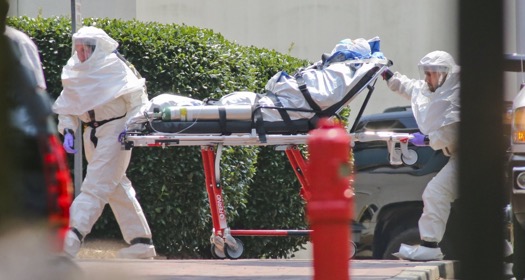Superbug Strikes Patient in Pennsylvania: A New Pandemic?

A patient in Pennsylvania was the first to be diagnosed with an antibiotic-resistant superbug in the United States. This news is sending shockwaves through the healthcare system as the dire predictions of officials have finally come true. They have been warning for years that if we didn’t curb our use of antibiotics, bacteria would mutate and become resistant to all known forms of treatment. Unfortunately, those warnings have gone unheeded, and we are now on the precipice of a public health catastrophe the likes none of us have ever seen.
Little Infections, Big Problems
The patient in question was admitted to the hospital after initial treatments for a urinary tract infection failed. As part of standard procedure, doctors administer stronger antibiotics until one of them knocks out a particular infection. This is exactly what happened in this case, with one notable exception. Treatments became more aggressive until doctors gave the patient was colistin, which proved to be ineffective against the strain of E. coli that the patient was fighting.
Colistin is considered to be one of a handful of antibiotics of last-resort, and is only administered when all other treatments fail. The fact that the infection was resistant to this medicine meant that the patient, and doctors had few options. Consequently, if patients get infected with these antibiotic-resistant drugs, many can die simply as infections spread out of control through the body.
This is really scary news, because most of us do not think of minor infections leading to life-threatening problems. We get infections all of the time, and doctors will start out by giving low-grade antibiotics such as penicillin, amoxicillin and clindamycin. Most people respond to treatments, but as time passes, and more bacteria mutate, more patients are requiring stronger and more dangerous antibiotics to kill simple infections.
What Now?
The biggest fear in healthcare circles is that highly-contagious infections such as TB may end up becoming incurable, and this can ultimately impact millions of people. There are already certain strains of tuberculosis that are resistant to antibiotics, and patients do die. However, these infections and deaths are not yet known to have struck Americans on American soil yet.
This case in Pennsylvania shows how this is not just a problem in other parts of the world. There will be more cases like this, and we are completely ill-equipped to deal with them at the present time. Many doctors fear that the only treatment options available to patients infected with a superbug is isolation, quarantine and palliative care. Palliative care is just a nice way of saying that patients will be made as comfortable as possible until they die.
What to Do
The best way to avoid becoming infected with a superbug is by prevention. This goes against conventional wisdom that we can just head to the doctor and get an antibiotic. Remember, it’s this conventional wisdom that has gotten us into trouble in the first place. While it’s impossible to completely remove risk associated with infections, there are a few simple things that we can do to minimize exposure.
First, it’s absolutely essential that we prepare foods properly. This involves cleaning and washing work areas and utensils and minimizing cross-contamination. Many antibiotic-resistant bacteria that are emerging on the scene come from food-borne illnesses. We also need to be careful about thoroughly cooking food prior to consumption. Make sure that you follow guidelines with respect to temperatures in order to ensure that bacteria are killed off before eating.
Second, it’s important to thoroughly clean and disinfect wounds as soon as they occur. Remember that any wound, small or big can provide the perfect environment for bacteria to grow. Make sure that you use soap and water along with antiseptic when cleaning wounds. Put ointment over the affected area and dress properly. Change bandages frequently and keep cleaning the wound until it heals. Finally, take advantage of wearing face masks in places that are congested with people or in hospitals. These are areas in which risk of catching a communicable disease that is brought on by bacteria will be highest.
You also want to wear gloves and other protective gear as appropriate when caring for someone with an infection. In extreme cases, isolation as well as keeping clothing and medical waste separate from general living areas will also help to minimize the spread of infections.
While we focus more on killer viruses or acts of terror with biological weapons, chances are that antibiotic-resistant bacteria will be more deadly and more pervasive. We are going to face a massive battle with superbugs in the not-too-distant future. This is why it’s so important to understand and appreciate this imminent threat and take appropriate action to protect yourself and your family.

